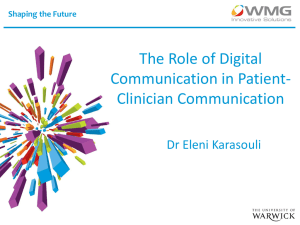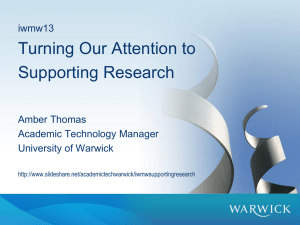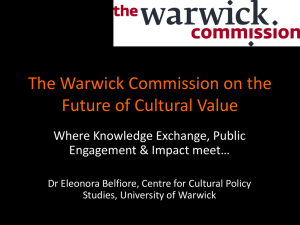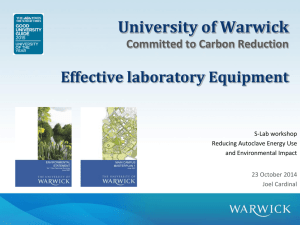Warwick-Duke Humanities Project
advertisement
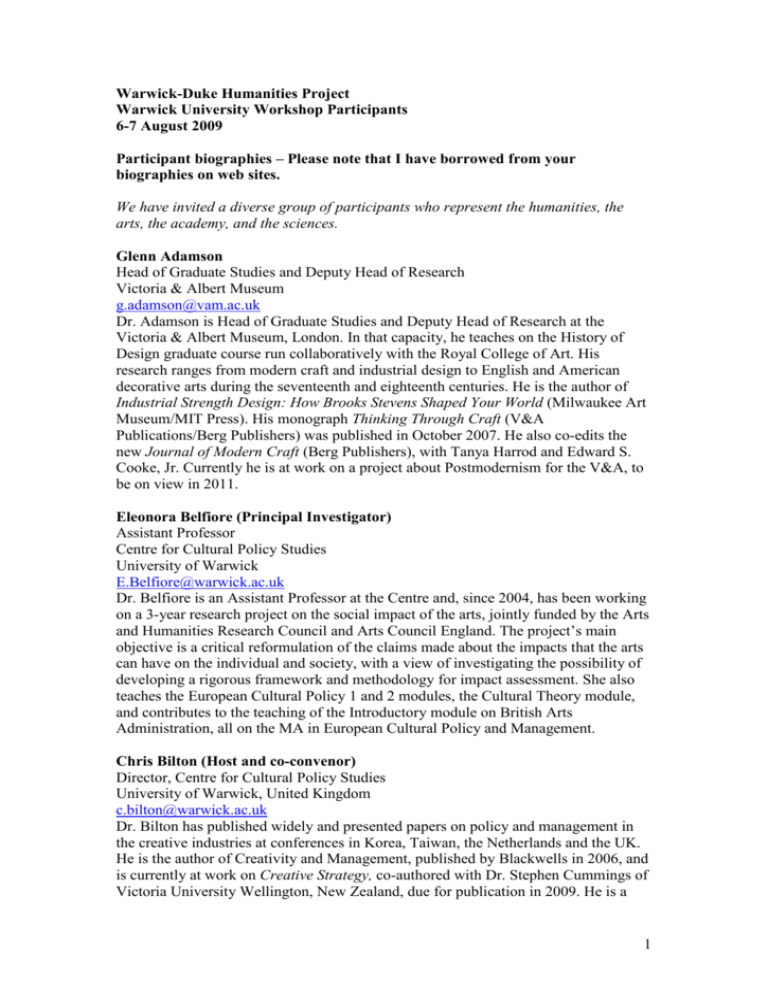
Warwick-Duke Humanities Project Warwick University Workshop Participants 6-7 August 2009 Participant biographies – Please note that I have borrowed from your biographies on web sites. We have invited a diverse group of participants who represent the humanities, the arts, the academy, and the sciences. Glenn Adamson Head of Graduate Studies and Deputy Head of Research Victoria & Albert Museum g.adamson@vam.ac.uk Dr. Adamson is Head of Graduate Studies and Deputy Head of Research at the Victoria & Albert Museum, London. In that capacity, he teaches on the History of Design graduate course run collaboratively with the Royal College of Art. His research ranges from modern craft and industrial design to English and American decorative arts during the seventeenth and eighteenth centuries. He is the author of Industrial Strength Design: How Brooks Stevens Shaped Your World (Milwaukee Art Museum/MIT Press). His monograph Thinking Through Craft (V&A Publications/Berg Publishers) was published in October 2007. He also co-edits the new Journal of Modern Craft (Berg Publishers), with Tanya Harrod and Edward S. Cooke, Jr. Currently he is at work on a project about Postmodernism for the V&A, to be on view in 2011. Eleonora Belfiore (Principal Investigator) Assistant Professor Centre for Cultural Policy Studies University of Warwick E.Belfiore@warwick.ac.uk Dr. Belfiore is an Assistant Professor at the Centre and, since 2004, has been working on a 3-year research project on the social impact of the arts, jointly funded by the Arts and Humanities Research Council and Arts Council England. The project’s main objective is a critical reformulation of the claims made about the impacts that the arts can have on the individual and society, with a view of investigating the possibility of developing a rigorous framework and methodology for impact assessment. She also teaches the European Cultural Policy 1 and 2 modules, the Cultural Theory module, and contributes to the teaching of the Introductory module on British Arts Administration, all on the MA in European Cultural Policy and Management. Chris Bilton (Host and co-convenor) Director, Centre for Cultural Policy Studies University of Warwick, United Kingdom c.bilton@warwick.ac.uk Dr. Bilton has published widely and presented papers on policy and management in the creative industries at conferences in Korea, Taiwan, the Netherlands and the UK. He is the author of Creativity and Management, published by Blackwells in 2006, and is currently at work on Creative Strategy, co-authored with Dr. Stephen Cummings of Victoria University Wellington, New Zealand, due for publication in 2009. He is a 1 member of the editorial board for the International Journal of Cultural Policy and has edited a special edition on 'Creativity and Cultural Policy' this year. At the Centre, Dr. Bilton has been the director of the MA in Creative and Media Enterprise since its inception in 1999. He worked in the cultural sector for ten years before coming to Warwick, touring Britain and Europe as a writer, performer and manager with Balloonatics Theatre Company and working as Arts Development Officer for City of Westminster Arts Council in London. Dr. Bilton has run workshops on management and creativity for managers at Warwick Business School and Copenhagen Business School. Egil Bjornsen Programme Director, MA in European Cultural Policy Management PhD Candidate, Centre for Cultural Policy Studies Egil.Bjornsen@warwick.ac.uk Prior to joining the Centre in 2002, Mr. Bjornsen held a number of managerial posts in the cultural sector both in Norway and the UK, including the National Theatre of Norway, the British Council in Oslo and the Royal Shakespeare Company. He takes a lead in cultivating the Centre’s engagement with the subsidised cultural sector and governmental cultural policy making bodies. He also takes a leading role in curricular development within the field of cultural policy and cultural management, which involves developing new teaching initiatives and delivery methods for both existing and potentially new student-segments. His research interests are Nordic (and particularly Norwegian) and British cultural policy, the relationship of cultural theory to cultural policy, the bildung-rationale behind cultural policy, cultural industries, audiences, audience research and audience development. He has presented his work at a range of international conferences and is an editorial board member of the Nordic Journal of Cultural Policy. Priscilla Bratcher Director of Development, Office of the Executive Director for the Arts University of North Carolina at Chapel Hill Priscilla_bratcher@unc.edu Ms. Bratcher joined the newly created Office of the Executive Director for the Arts at the UNC in 2005, returning to the university after working with the Royal Shakespeare Company. To the position she brought over 20 years of fundraising experience, beginning with the UNC Center for Public Television. During her five years there, she led a team to its first national PBS award for on-air fundraising. From 1990-94, she served as Vice President for Development of the American Social Health Association and in 1994, moved to Capital Consortium where she worked with clients in three states to design and implement multi-million dollar capital campaigns. From 1998-2003, she served as Director of Principal Gifts at UNC, managing $1M+ prospects for the university's Carolina First capital campaign, while raising $5M for the renovation of Memorial Hall, one of the university’s signature historic buildings and home to the new Carolina Performing Arts Series. In 2003, she was appointed first managing director of the Royal Shakespeare Company America, the British theatre company’s U.S. fundraising office. She holds an M.F.A. in Arts Management from the University of Iowa. Her numerous speaking engagements have taken her from London to Mexico City. 2 Catherine Bunting Director of Research Arts Council England Catherine.Bunting@artscouncil.org.uk Ms. Bunting is Director of Research at Arts Council England, where she leads a team of researchers to explore the role of the arts in national life and the opportunities and challenges for public funding of the arts. Catherine led the arts debate, the Arts Council’s first public value inquiry, and is an active member of the project group for Taking Part, a national survey of cultural participation led by the Department for Culture, Media and Sport. Prior to joining the Arts Council, Catherine established the research department at Arts & Business and developed a programme of work to explore the relationship between the arts and the private sector. She spent a number of years overseas and has worked as a researcher for the Australia Business Arts Foundation. She has a Master's in Applied Statistics and began her career as a statistician in a software development company. Stephen Bury (Presenter) Head of European and American Collections The British Library stephen.bury@bl.uk Dr. Bury studied Modern History at Balliol College, Oxford, where he won the H.W.C. Davis University History Prize. He was Librarian of Chelsea School of Art 1985-2000 and became Head of Modern English Collections at the British Library in 2000 and Head of European and American collections in 2002. Current responsibilities at the British Library include Research and Web Archiving. He has published widely on twentieth and twenty-first century art, including Artists' Books (1995) and Artists' Multiples (2001), contributed to the Oxford Dictionary of National Biography (2004) and has written regularly for Art Monthly since 1997. Whilst at Chelsea School of Art, he taught on the MA History and Theory of Modern Art and he continues to supervise PhD students. He is Chair of the Board of Book Works and on the Board of Matt's Gallery, London. Boyun Choe PhD Candidate, Centre for Cultural Policy Studies University of Warwick Ms. Choe’s thesis is entitled ‘Comparative Studies on Creative and Cultural Education Policies between England and South Korea’. David Looseley Professor of Contemporary French Culture School of Modern Languages and Cultures University of Leeds d.looseley@leeds.ac.uk Professor Looseley is founder and director of the Popular Cultures Research Network, an international, interdisciplinary community of some 90 researchers, postgraduates, and arts practitioners. His research concerns the contemporary history of cultural practices, policies, and institutions, in particular popular culture. Interdisciplinary in scope, it combines historical and political perspectives with an interest in the discourses and cultural debates such practices, policies, and institutions engender. He 3 has written extensively in these fields, including The Politics of Fun: Cultural Policy and Debate in Contemporary France (Berg, 1995), Popular Music in Contemporary France: Authenticity, Politics, Debate (Berg, 2003), and ‘The Return of the Social: Thinking Postcolonially about French Cultural Policy’, International Journal of Cultural Policy (July 2005). He is currently co-editing a monograph for Manchester University Press (due 2010) on constructions of the popular in contemporary French culture. He is also working on a comparative study of discourses of the popular in French and UK cultural policies and has written in French on UK cultural policy for the French Ministry of Culture’s volume commemorating its fiftieth anniversary. He is on the editorial board of the International Journal of Cultural Policy and the advisory boards of French Cultural Studies and the French popular music journal Volume Copyright. He was recently made Chevalier dans l’Ordre des Palmes Académiques by the French Ministry of Education. Patrick McGeer Master Scientist Hewlett-Packard Laboratories, Palo Alto, California Rick.mcgeer@hp.com Dr. McGeer received his PhD in Computer Science from the University of California at Berkeley in 1989. He was an Assistant Professor in the Computer Science Department at the University of British Columbia, until returning to UC-Berkeley as a Research Engineer in 1991. In 1993, together with three collaborators, he founded the Cadence Berkeley Laboratories. In 1998, with Alex Saldanha, he founded Softface, Inc., the world leader in automated content classification and spend analysis, where he remained as Chief Scientist until 2003. In 2003 he joined Hewlett-Packard Laboratories. Dr. McGeer holds seven patents in the fields of programming languages, circuit design, and natural-language processing. He is author of over 50 papers and one book in the fields of Computer-Aided Design, circuit theory, programming languages, and information system design. His research interests include logic synthesis, timing analysis, formal verification, circuit simulation, programming languages, and wide-area distributed systems. Jim McGuigan Professor of Cultural Analysis and Sociology Loughborough University j.t.mcguigan@lboro.ac.uk Professor McGuigan’s research interests cover the following: contemporary social theory, cultural studies and policy, and television and representation. He has published a number of books, his best known being Cultural Populism, which came out in 1992. Since then, he has published Culture and the Public Sphere (1996), Cultural Methodologies (1997), Modernity and Postmodern Culture (1999, 2nd edn 2006), and Rethinking Cultural Policy (2004); and he has co-edited Studying Culture (1993 and 1997) with Ann Gray and Technocities (1999) with John Downey. As well as several chapters in edited collections, he has published articles in Anglo-Saxonica, Cultural Politics, Cultural Studies, Cultural Studiesß>Critical Methodologies, European Journal of Cultural Studies, Flow, Guaraguao - Revista de Cultura Latinamericana, Human Technology, International Journal of Cultural Policy, The Leveller, Media International Australia, New Left Review, New Socialist, New Statesman, Poetics, Sociological Review and Sociology. His work has been translated into a number of languages, including Chinese. His most recent empirical research 4 project was on the Millennium Dome, funded by the Arts and Humanities Research Board. He is also a Visiting Fellow in Cultural Policy at the University of Warwick, a Panel Member and College Member of the Arts and Humanities Research Council and a Fellow of the Royal Society for the Arts. He serves on five editorial boards and has various links with universities around the world where he has been a visiting professor. Currently, he is working on two main research themes: ‘cool capitalism’ and ‘funny politics’. Paola Merli Lecturer in Cultural Studies School of Modern Languages and Cultures University of Nottingham Paola.Merli@nottingham.ac.uk Dr. Merli’s research interests are in the relationship between politics and the arts; in the history of, and current developments in, cultural policy, politics and institutions; in representations of artists and the arts in documentaries, film and other media; and in cultural theory (particularly the work of Antonio Gramsci). She has published an influential methodological critique of approaches to the evaluation of the social impact of the arts in the International Journal of Cultural Policy (2002), articles in the International Journal of the Humanities (2005/6) and the International Journal of the Arts in Society (2007), and a scholarly introduction to a book on Italian theatre institutions (Mondadori Electa, 2006). She is currently preparing a monograph titled The Battle for la Scala: The Opera House and Cultural Policy. Other forthcoming work includes journal articles on Gramsci and cultural policy; on the cultural politics of the Royal Opera House in the 1950s and 1960s; and on representations of the opera house in the media in the 1990s. She is book reviews editor for the journal Cultural Trends. Jonothan Neelands Chair of Drama and Theatre Education and Director of Teaching and Learning, Institute of Education University of Warwick J.Neelands@warwick.ac.uk Professor Neelands is an associate of the CAPITAL Centre for creativity and performance in teaching and learning, which is a joint initiative between the University of Warwick and the Royal Shakespeare Company. He is closely involved in the Royal Shakespeare Company’s Time For Change campaign to improve the quality of Shakespeare teaching at secondary and higher education levels. Professor Neelands has advised government on the identification and training of talented young performers and is Research Consultant for the National Council of Drama Training and a member of the RSC Education Advisory Group. He has trained teaching artists at the New Victory Theater in New York since 2005. Recent research projects have been in partnership with Birmingham Royal Ballet, RSC and the National Association of Youth Theatres amongst others. Professor Neelands is the author of several texts for teachers and students, which have influenced the development of drama in recent years including Structuring Drama Work, Beginning Drama 11-14, Key Shakespeare 1 and 2 and Drama and Theatre Studies at A/S and A level. His latest publication is Improving Your Primary School Through Drama. Research interests include cultural and creative learning, the politics of cultural and education policy-making, teaching in 5 urban settings, the sociology of educational disadvantage and the articulation of a prosocial pedagogy of arts education. Mark O’Neill (Presenter) Head of Arts and Museums Cultural and Leisure Services Glasgow City Council Mark.o’neill@cls.glasgow.gov.uk Mr. O’Neill was appointed Head of Glasgow Museums in 1998, the largest civic museum service in the United Kingdom. He began his museum career in Glasgow in 1986, working for a local trust to establish a museum in Springburn. In 1990 he was appointed Keeper of Social History in Glasgow City Council's museum service. His major projects since then include setting up the Open Museum, Glasgow's awardwinning outreach service, the St. Mungo Museum of Religious Life and Art, one of only four museums of religion in the world, and the redisplay of the People’s Palace. For the past ten years he has been working on the philosophy and funding for the restoration and redisplay of Kelvingrove Art Gallery and Museum, the most visited museum in Britain outside London. In 2005 he was appointed Head of Arts and Museums for Glasgow City Council. Michael Parker Pearson (Presenter) Professor of Archaeology University of Sheffield M.Parker-Pearson@Sheffield.ac.uk Professor Pearson is an internationally renowned expert in the archaeology of death and also specialises in the later prehistory of Britain and Northern Europe and the archaeology of Madagascar and the western Indian Ocean. He has published more than 10 books and over 100 academic papers, on topics that range from architecture, food and warfare to ethnoarchaeology, archaeological theory and heritage management. He has worked on archaeological excavations in Britain, Denmark, Germany, Greece, Madagascar, Syria and the United States, and currently directs field projects in the Outer Hebrides, Madagascar and the Stonehenge World Heritage Site. He has been a Member of the Institute of Field Archaeologists (MIFA) since 1989 and a Fellow of the Society of Antiquaries since 1991. He has been on the council of the Prehistoric Society since 1999 and is currently the Society's conservation coordinator. Jan Parker (Presenter) Senior Research Fellow Institute of Educational Technology The Open University Jan.parker@open.ac.uk Dr. Parker is Chair of the Humanities Higher Education Research Group, Editor-inChief of Arts and Humanities in Higher Education, and a series editor of books in the SAGE series “Teaching and Learning the Humanities in Higher Education’. She is UK institutional leader of a programme of the Carnegie Academy for the Scholarship of Teaching and Learning, and Research Associate of the Cornell Centre for Writing in the Disciplines. She researches and publishes on disciplinarity and academic writing, as well as in her discipline of Classics. She has published extensively. Two 6 co-edited books on ‘Translation: The Classic and the Modern’ were in press in the USA and UK in 2008. Anna Upchurch (Project coordinator) Teaching Fellow, Centre for Cultural Policy Studies University of Warwick, Coventry, UK Anna.upchurch@warwick.ac.uk Dr. Upchurch holds a PhD in Cultural Policy Studies from the University of Warwick. She is a former marketing communications practitioner who worked extensively with arts and cultural institutions over two decades in North Carolina. She is interested in the history of ideas about the arts in society and in the position of creative individuals and organizations in market economies. She also holds an M.A. in Liberal Studies from Duke University. Donna Zapf (Co-convenor and Presenter) Director, Graduate Liberal Studies program Duke University dzapf@duke.edu Dr. Zapf is trained in classical music, plays clarinet, and has academic degrees in musicology. Her teaching interests have focused on interdisciplinary and contextual approaches to the histories and theories of the fine and performing arts. Her research interests include contemporary music and opera, multiculturalism, cultural policy, and the arts in Canada. Prior to her appointment at Duke, she directed the Graduate Liberal Studies program at Simon Fraser University (SFU) in Vancouver, Canada, and chaired the MFA program and taught in the School for the Contemporary Arts there. Jonathan Breckon (Observer) Director of Policy and Public Affairs Arts and Humanities Research Council Professor Shearer West (Observer) Director of Research Arts and Humanities Research Council 7
